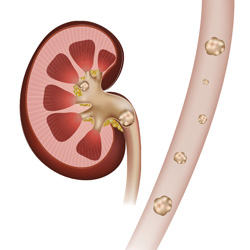
Have you ever had a kidney stone? If your answer is yes, then you know the pain that sends more than half a million people to emergency rooms every year. And you are far from alone—1 in 10 people will get a kidney stone at some point in their lives. Here's what you need to know about kidney stones, the symptoms you should look out for, and what you can do to prevent them.
Kidney stones are hard, tiny objects that develop in the kidneys. Your urine contains a variety of waste chemicals, which are usually swept out of your body when you urinate. But when there isn't enough water in your urine, those chemicals begin to
form crystals that clump together and turn into kidney stones.
Once formed, a kidney stone can stay put in the kidneys or pass through the urinary tract. If a kidney stone is very small, it may pass through your system without causing much pain. Stones that don't pass through easily can cause urine to back up in the kidney, bladder or urethra.
The smallest kidney stones are about the size of a grain of sand and cause little to no discomfort. As they get bigger, you're more likely to start experiencing symptoms, including:
• Pain in your side or back.
• Blood in your urine.
• Upset stomach.
• Fever and chills.
• Off-smelling urine.
• Urine that looks cloudy.
If you spot any of these signs of a kidney stone, you should call your doctor right away. They may suggest you drink more water to try and flush the stone out. If that happens, strain your urine and bring any kidney stone pieces to your appointment.
If the kidney stone doesn't pass, they may recommend surgery to remove it.
Here are some steps you can take to reduce your chances of developing a kidney stone:
• Drink enough water every day to keep your urine clear or very light yellow.
• Eat plenty of fruits and vegetables. These make urine less acidic, which discourages kidney stone formation.
• Avoid animal protein. It makes urine more acidic.
• Cut back on sugar. Sugar-sweetened drinks may increase your risk of kidney stones.
If you have questions about kidney stones or kidney health, schedule an appointment with a Watson Clinic nephrologist by calling 863-680-7190 or visiting
WatsonClinic.com/Nephrology.
Sources: National Institute of Diabetes and Digestive and Kidney Diseases; National Kidney Foundation